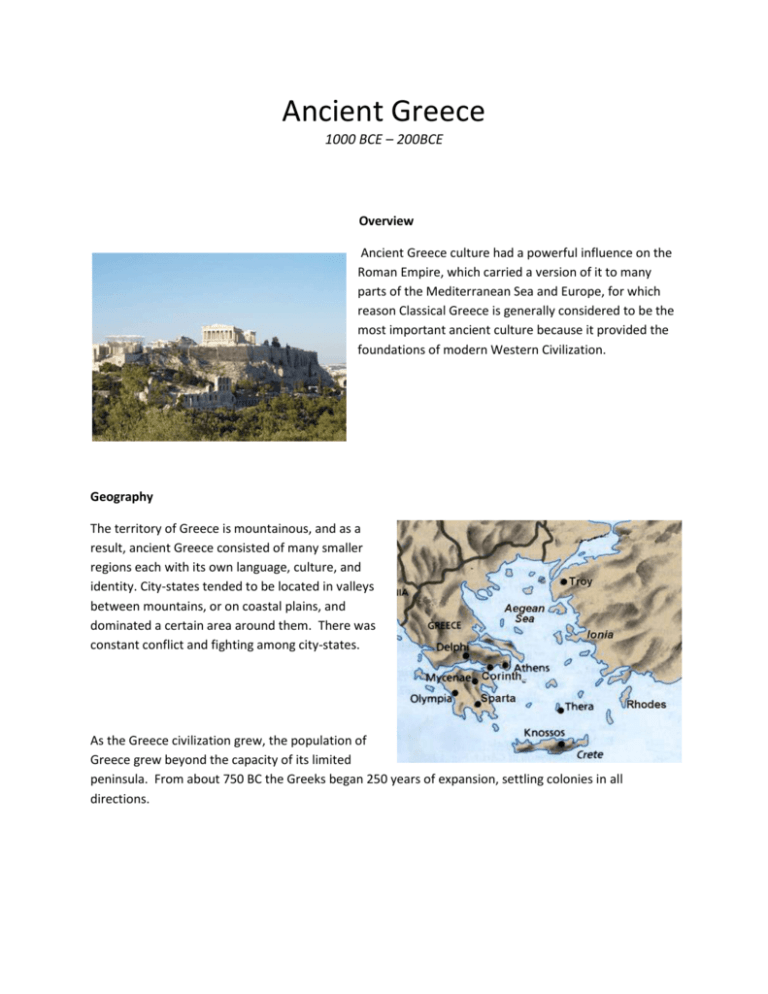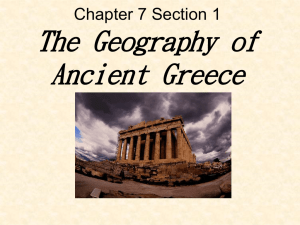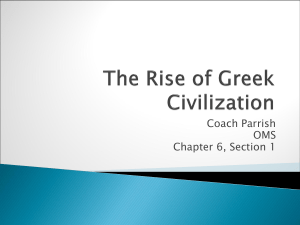Ancient Greece 1000 BCE – 200BCE Overview Ancient Greece
advertisement

Ancient Greece 1000 BCE – 200BCE Overview Ancient Greece culture had a powerful influence on the Roman Empire, which carried a version of it to many parts of the Mediterranean Sea and Europe, for which reason Classical Greece is generally considered to be the most important ancient culture because it provided the foundations of modern Western Civilization. Geography The territory of Greece is mountainous, and as a result, ancient Greece consisted of many smaller regions each with its own language, culture, and identity. City-states tended to be located in valleys between mountains, or on coastal plains, and dominated a certain area around them. There was constant conflict and fighting among city-states. As the Greece civilization grew, the population of Greece grew beyond the capacity of its limited peninsula. From about 750 BC the Greeks began 250 years of expansion, settling colonies in all directions. Eventually Greek colonization reached as far northeast as present day Ukraine and Russia. To the West the coasts of Illyria, Sicily and Southern Italy were settled, followed by Southern France, Corsica, and even northeastern Spain. Greek colonies were also founded in Egypt and Libya. Culture Art and Architecture The art of ancient Greece has had an enormous influence on the culture of many countries from ancient times until the present, particularly in the areas of sculpture and architecture. In the West, the art of the Roman Empire was largely influenced from Greek models. In the East, Alexander the Great's conquests initiated several centuries of Greek culture in many other cities and cultures in the Mediterranean, Europe, northern Africa, and much of Asia. Science and Technology Ancient Greek mathematics included the basic rules of geometry, the idea of formal mathematical proofs, and discoveries in number theory and applied mathematics. The discoveries of several Greek mathematicians, including Pythagoras, Euclid, and Archimedes, are still used in mathematical teaching today. The Greeks also developed astronomy, which they treated as a branch of mathematics. The first geometrical, three-dimensional models to explain the motion of the planets were developed by the ancient Greeks. The Greek astronomer Heraclides Ponticus proposed that the Earth rotated around an axis. The ancient Greeks also made important discoveries in the medical field. Hippocrates was a physician and is considered one of the most outstanding figures in the history of medicine. Religion Greek mythology is the body of myths and legends belonging to the ancient Greeks concerning their gods and heroes, the nature of the world, and the origins and significance of their culture. Modern scholars study ancient Greek mythology in order to learn more about their religion, political beliefs, and their daily life. Myths were written and used by Greeks to explain the origins of the world. They usually included adventures of a wide variety of gods, goddesses, heroes and heroines, and mythological creatures, like Medusa, who had the upper body of a woman, but the lower half of a serpent and snakes instead of hair. Olympics The Olympic Games were a series of athletic competitions between ancient Greek city-states in honor of Zeus. The exact origins of the Games are shrouded in myth and legend but records indicate that they began in 776 BC in Olympia in Greece. The ancient Olympics were rather different from the modern Games. There were fewer events, and only free men who spoke Greek could compete. The winner of an Olympic event was awarded an olive wreath and often was received with much honor throughout Greece, especially in his home town, where he was often granted large sums of money. Sculptors would create statues of Olympic victors, and poets would sing odes in their praise for money. Some of the most popular events were wrestling and the foot race. Only men could compete, and they often competed completely naked! Education For most of Greek history, education was private, except in Sparta. Some city-states established public schools. Only wealthy families could afford a teacher. Boys learned how to read, write and quote literature. They also learned to sing and play one musical instrument and were trained as athletes for military service. They studied not for a job, but to become an effective and loyal citizen. Girls also learned to read, write and do simple arithmetic so they could manage the household. The Greek alphabet is still used today, especially in college and university fraternities and sororities. Social Structure Only free, land owning, native-born men could be citizens entitled to the full protection of the law in a city-state. In Athens, the population was divided into four social classes based on wealth. People could change classes if they made more money. In Sparta, all male citizens were given the title of equal if they finished their education. However, Spartan Kings, who served as the city-state's military and religious leaders, came from only two families. Politics Ancient Greece consisted of several hundred independent city-states. The geography of Greece, which was divided and sub-divided by hills, mountains and rivers, contributed to the fragmentary nature of ancient Greece. The ancient Greeks had no doubt that they were 'one people'; they had the same religion, same basic culture, and same language. Yet, the city-states were fiercely loyal and often had very different government systems. The domination of politics by small groups of families caused problems in many city-states. Sometimes, a tyrant would at some point seize control and govern according to their own will. In a system filled with class conflict, government by a dictator was often the best solution. The rise of Ancient Greek democracy came about after Athens fell under the tyranny of many evil dictators. When this tyranny ended, the Athenians founded the world's first democracy as a solution to prevent the aristocracy from regaining power. After the rise of the democracy in Athens, other citystates in Greece developed democracies. Sparta did not. Sparta continued to rule under an oligarchy. This meant that a small group of warriors ran the government. This small group was made up of members of the same two families, generation after generation. Spartan Kings could only be hereditary. Warfare Sparta and Athens were always at war with each other. They viewed life differently and Sparta, being the smaller city-state, often feared the growing population of Athens. They fought each other over hundreds of years. Legacy The civilization of ancient Greece has been immensely influential on language, politics, educational systems, philosophy, science, and the arts. Mankind owes a lot to the ancient Greece civilization, and can still see their influences around the world, especially in the USA!







